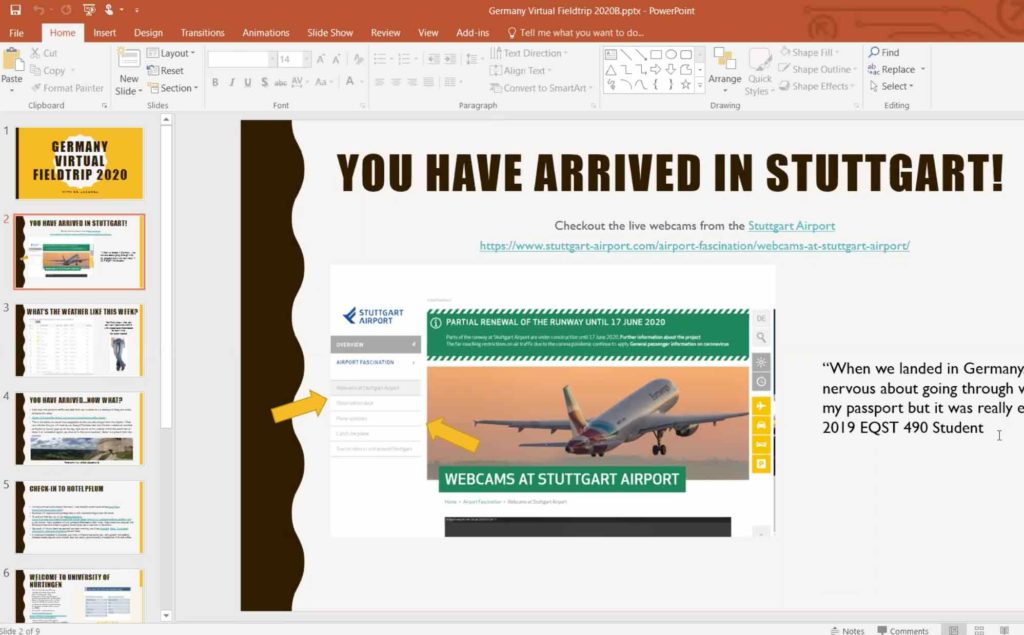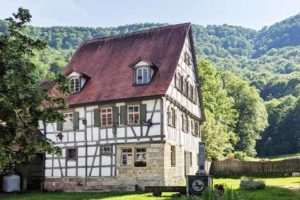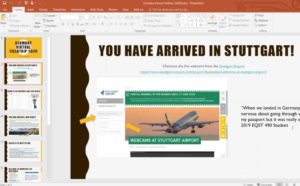
05 Jun UF Equine Students Virtually Experience Germany
Every spring, a group of equine students prepare to travel to Germany, where Kimberly LaComba, Ph.D., assistant professor of teaching in equine business management, looks forward to helping her students widen their global lens. Despite this trip being cancelled due to the Coronavirus (COVID-19), LaComba is still committed to providing her students with an experience that will expand their worldview virtually this semester.
Advanced Topics in Equine Science (EQST 490) is an online course within the Equestrian Studies Programs that prepares students to go on a study abroad trip to Germany that focuses on Equine Business Management every spring. Throughout the semester students learn about Germany, its equine industry, how it compares to the United States’ equine industry, and cultural sensitivity. The culmination of this knowledge is when students traditionally travel to Germany in June. Once the students are in Germany, they spend approximately fourteen days being taught by German equestrian instructors at the University of Nürtingen, visiting a variety of equine business locations, and exploring other areas of Germany. However, due to COVID-19 the Spring 2020 course has gone a little differently than planned, inspiring LaComba to create a virtual field trip to Germany.
 In March, LaComba decided to put together an impromptu Zoom meeting with students in the course. “I wanted them to know I am doing everything I can and so is the University to support this opportunity for them,” said LaComba. “I also wanted them to know that I’m here for them and that I was concerned and wanted to make sure they were all okay and answer any questions they may have.” The very next day, the class got a message that they would have to cancel their trip because the amount of COVID-19 cases in Germany were progressing very quickly. “It was definitely the right call,” LaComba said. “Our students’ safety is always number one.”
In March, LaComba decided to put together an impromptu Zoom meeting with students in the course. “I wanted them to know I am doing everything I can and so is the University to support this opportunity for them,” said LaComba. “I also wanted them to know that I’m here for them and that I was concerned and wanted to make sure they were all okay and answer any questions they may have.” The very next day, the class got a message that they would have to cancel their trip because the amount of COVID-19 cases in Germany were progressing very quickly. “It was definitely the right call,” LaComba said. “Our students’ safety is always number one.”
Since the study abroad trip was cancelled, LaComba took her teaching to the next level by offering virtual versions of what the students would have seen and experienced if they were able to go to Germany in June. “The more I researched, virtually, the different locations we would have visited in person, the more I realized how it is possible to provide a different international experience using technology,” she said.
The first stop on EQST 490’s virtual field trip is the Stuttgart Airport in Stuttgart, Germany. LaComba was able to find live webcam streaming from the airport for students to watch. “I wanted to provide students with what they would have experienced as they were flying into Stuttgart,” she said. In addition, LaComba let students know what the weather was going to be like in Nürtingen, Germany while they were there. “This way students are prepared for what to wear and of course I reminded them to bring their jeans and closed toe shoes for our barn visits,” stated LaComba. The next stop on this virtual field trip to avoid some jet lag, is a tour of Castle Hohenneuffen. LaComba provided a link to the Castle Hohenneuffen website for students to see photos and videos of the castle. Furthermore, on this website there are other highlights and links to other gardens, castles, and monasteries that are national monuments in Germany, allowing the students to see even more than what time would’ve allowed for in person.
Moving on, the next stop on this virtual field trip is students checking into their hotel rooms. LaComba provided students with a link to their hotel website, so they could see photos of the hotel and imagine what it would have looked like. Next, the students are going to dinner together in the evening at Slaughterhouse Bräu – Nürtingen, which is actually a former slaughterhouse and holds a lot of history. “More than likely at the restaurant this is where many students would have tried their first authentic German Schnitzel for dinner,” said LaComba.
 Students would have spent a majority of their time at the University of Nürtingen, learning about equine business under the instruction of German equestrian professors and learning more about German agriculture. Students would have spent some time learning about horse feed production and visited the oldest state stud in not only Germany, but the world. “I just kept adding different places we would have gone on this trip, so that my students could experience it at a distance and are hopefully encouraged to go in the future,” she said.
Students would have spent a majority of their time at the University of Nürtingen, learning about equine business under the instruction of German equestrian professors and learning more about German agriculture. Students would have spent some time learning about horse feed production and visited the oldest state stud in not only Germany, but the world. “I just kept adding different places we would have gone on this trip, so that my students could experience it at a distance and are hopefully encouraged to go in the future,” she said.
Even though she wasn’t able to physically go to Germany, EQST 490 student Mikayla Miller said she really enjoyed the virtual Germany immersion trip. “It was interesting to be able to see pictures of the hotel, restaurants, and locations we were going to visit,” Miller said. “The websites for each location gave me an idea on what we would’ve learned and what they had to offer while we were there. Hopefully sometime in the near future, I will be able to travel to Germany to experience it in person.”
LaComba does not want her students to give up on widening their global lens, especially during the COVID-19 pandemic. “The world is different right now from what we are all used to experiencing and the difference that we are each experiencing is unique,” she said. “Each culture is different and that is so important to remember and respect, however, various cultures have commonalities too. The world on a global level right now is an example of commonality.”
“In the future, continue your search to widen your global lens,” LaComba said to her students. “It’s worth it and so are you!”
To learn more about the equestrian programs, visit https://www.findlay.edu/sciences/equestrian-studies/.
Learn more about the study abroad options at Findlay at https://www.findlay.edu/offices/student-affairs/buford-center-diversity-service/international-education/study-abroad.






